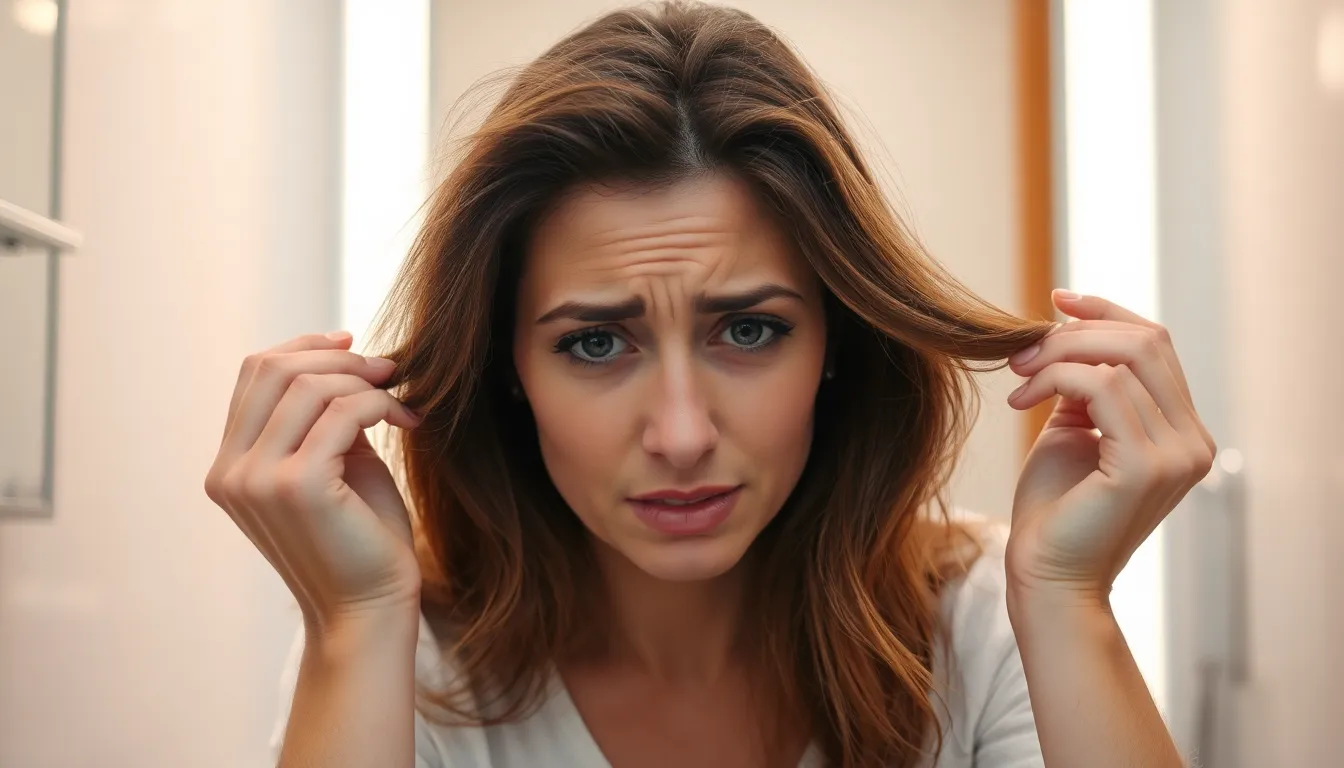When it comes to finding relief from migraine pain, Qulipta has become a popular choice. But while it might help keep those relentless headaches at bay, some users have raised an eyebrow at a rather unexpected side effect: hair loss. Yes, you read that right. The very medication meant to help you feel like a million bucks could leave you feeling a little less than fabulous up top.
Table of Contents
ToggleOverview of Qulipta
Qulipta, known generically as atogepant, serves as a preventive treatment for migraine. This oral medication targets the CGRP receptor, which plays a crucial role in the onset of migraine attacks. Users often find Qulipta effective in reducing the frequency of migraines, significantly improving their quality of life.
Some reports emerge from patients experiencing hair loss as a side effect. While hair thinning can affect emotional well-being, the extent and frequency of this side effect vary among individuals. Clinical trials indicate that hair loss may occur in a small percentage of users, but precise figures reflect varying experiences.
Qulipta, like other medications, can lead to various side effects beyond hair loss. Fatigue, nausea, and constipation are common complaints reported during treatment. Each patient responds differently, highlighting the importance of consulting healthcare professionals for tailored advice.
Heeding professional recommendations offers patients a better understanding of Qulipta’s potential impact on hair health. Monitoring any changes while on the medication allows for informed discussions with healthcare providers about experiences and concerns. Staying aware of one’s health journey remains essential in addressing side effects effectively.
Choosing to stay informed about Qulipta’s benefits and risks empowers patients to manage their migraine treatment responsibly. Openness with healthcare professionals about side effects ensures a comprehensive approach to managing both migraine and hair health.
Understanding Hair Loss

Hair loss can be a concerning side effect associated with Qulipta. Understanding its types and causes helps patients navigate their experiences effectively.
Types of Hair Loss
Alopecia is one common type of hair loss. This condition can manifest as patches of hair loss or thinning throughout the scalp. Telogen effluvium occurs when a significant number of hair follicles enter a resting phase, leading to noticeable shedding. Androgenetic alopecia, often known as male or female pattern baldness, presents a gradual thinning that can affect emotional well-being. Individual responses to Qulipta vary, and some users may experience these types of hair loss during treatment.
Causes of Hair Loss
Many factors can contribute to hair loss. Genetics plays a significant role, with family history often influencing an individual’s likelihood of experiencing thinning hair. Hormonal changes from medications like Qulipta may also impact hair health. Stress, whether physical or emotional, significantly contributes to hair loss as well. Nutritional deficiencies create another risk, as inadequate vitamins and minerals can lead to weakened hair. Lastly, underlying medical conditions such as autoimmune diseases can also initiate hair loss. Understanding these causes supports informed discussions with healthcare providers about treatment experiences.
Qulipta and Its Uses
Qulipta, or atogepant, serves as a preventive treatment for migraines. This medication targets the CGRP receptor, effectively reducing the frequency of migraine attacks. Users often experience an improvement in their quality of life due to fewer migraine episodes.
Some patients, however, report hair loss as an unexpected side effect. Hair thinning can significantly affect emotional well-being, making it a concern among those taking Qulipta. While the incidence of hair loss remains low in clinical trials, some users have noted this specific side effect.
Types of hair loss linked to Qulipta include alopecia, which can manifest as patchy hair loss or general thinning. Another possibility is telogen effluvium, where numerous hair follicles enter a resting phase, leading to noticeable shedding. Androgenetic alopecia may also occur in certain cases.
Contributing factors to hair loss vary among individuals. Genetics often play a significant role in hair health. Hormonal changes induced by medications or stress can exacerbate the issue. Nutritional deficiencies and underlying medical conditions also influence hair loss experiences.
Discussing these concerns with healthcare providers proves vital for patients. Open and informed conversations about the potential side effects allow for tailored advice and effective monitoring during treatment. Engaging with professionals empowers patients to manage their migraine treatment responsibly.
Qulipta Side Effects
Qulipta, like other medications, may produce various side effects. Awareness of these effects is crucial for patients undergoing treatment.
Common Side Effects
Fatigue and nausea frequently occur among users of Qulipta. Users report constipation alongside these symptoms. Additionally, some individuals experience hair loss, which, although concerning, affects only a small percentage of users. Reports indicate that many find these common side effects manageable. Patients experiencing these symptoms should consider discussing them with healthcare providers for possible adjustments to their treatment plans.
Rare Side Effects
Certain rare side effects have also been documented. Some individuals report allergic reactions, which may manifest as rash or itching. Severe fatigue and dizziness can also arise but are less frequently observed. Hair loss may escalate in some cases, raising further concerns about the medication’s impact on well-being. Healthcare professionals encourage open dialogue to address any emerging symptoms effectively. Monitoring these less common side effects can lead to better management strategies and improved treatment outcomes.
The Link Between Qulipta and Hair Loss
Qulipta, while effective for migraines, has raised concerns regarding hair loss among some users. Understanding the connection between Qulipta and this side effect requires examining clinical studies and patient testimonials.
Clinical Studies
Clinical research indicates that hair loss may affect a small percentage of patients taking Qulipta. In controlled trials, instances of hair thinning appeared with varied frequencies. A significant part of the analysis highlighted reports of telogen effluvium and alopecia among participants. Experts suggest that hormonal changes may be a contributing factor, impacting hair follicle cycles. Though clinical observations note hair loss, the data shows it remains relatively rare compared to other side effects.
Patient Testimonials
Patient experiences offer insights into the side effects of Qulipta, including hair loss. Many individuals report varying degrees of hair thinning, with some finding it distressing. Stories often mention frustration over unexpected shedding, prompting discussions with healthcare providers. While some patients noticed a gradual return of hair, others experienced prolonged issues. These testimonials showcase the emotional impact of hair loss, emphasizing the importance of addressing concerns with medical professionals.
Managing Hair Loss from Qulipta
Managing hair loss associated with Qulipta requires proactive measures. Patients experiencing this side effect can explore several treatment options and prevention strategies.
Treatment Options
Minoxidil serves as a topical solution that stimulates hair growth and is available over the counter. Finasteride, prescribed for men, blocks hormones contributing to hair loss. Corticosteroids may reduce inflammation in specific cases of alopecia. Low-level laser therapy offers a non-invasive approach, promoting hair regrowth without chemical intervention. Consultation with a dermatologist provides tailored recommendations based on individual needs.
Prevention Strategies
Maintaining a balanced diet supports hair health by supplying essential nutrients. Incorporating vitamins such as biotin and iron improves hair’s strength and growth. Managing stress through techniques like meditation or yoga may reduce hair loss severity. Utilizing gentle hair care products prevents additional damage, while avoiding excessive heat styling protects existing hair. Regular communication with healthcare providers ensures ongoing assessments of treatment impact.
Qulipta offers significant relief for migraine sufferers but can bring unexpected side effects like hair loss. While this concern affects a small percentage of users, it’s crucial for patients to be proactive about their treatment. Open discussions with healthcare providers can help address any side effects experienced, including hair thinning.
Managing this issue involves exploring various treatment options and adopting preventive strategies. By taking a comprehensive approach to both migraine management and hair health, individuals can work towards maintaining their overall well-being. Awareness and communication remain key in navigating the complexities of treatment with Qulipta.



